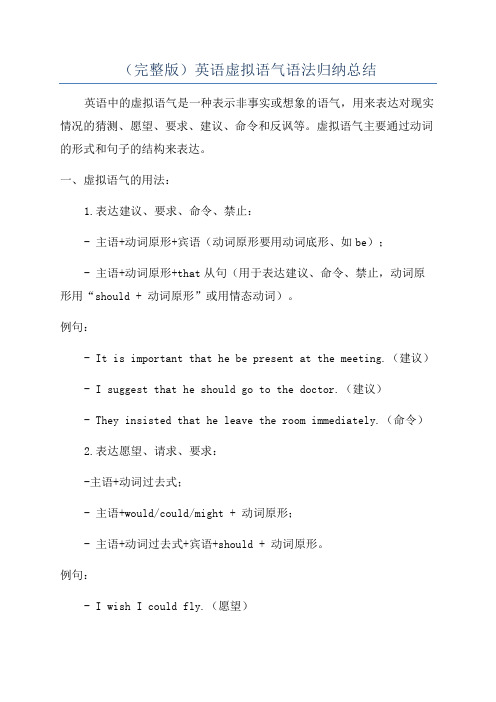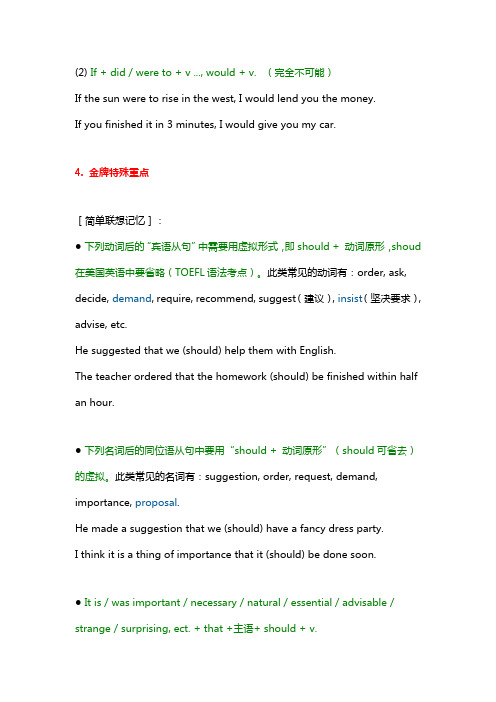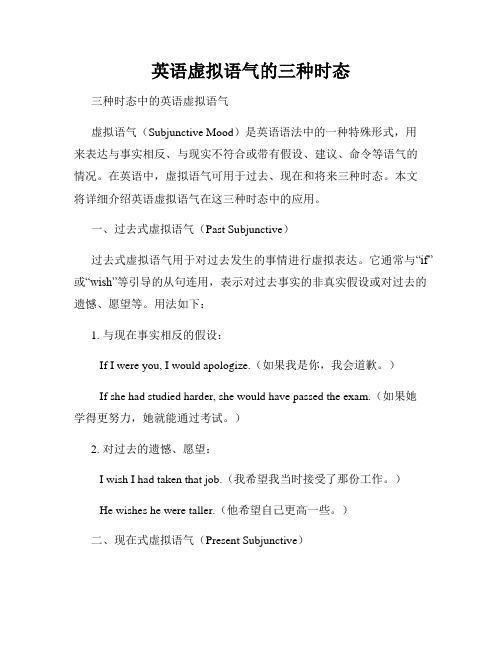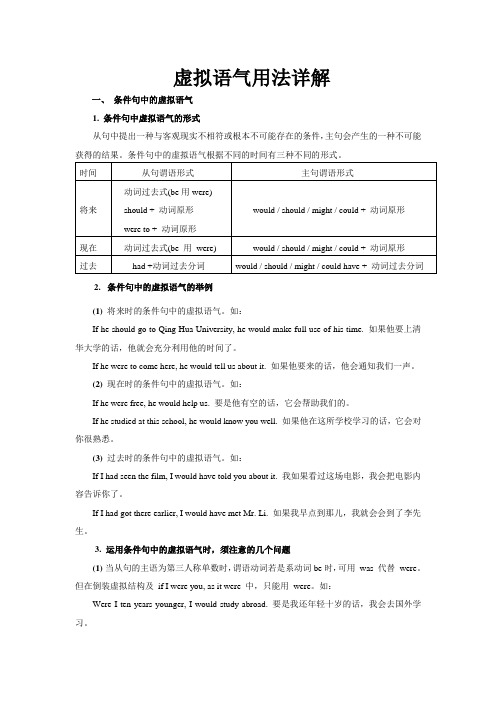英语语法之虚拟语气
(完整版)英语虚拟语气语法归纳总结

(完整版)英语虚拟语气语法归纳总结英语中的虚拟语气是一种表示非事实或想象的语气,用来表达对现实情况的猜测、愿望、要求、建议、命令和反讽等。
虚拟语气主要通过动词的形式和句子的结构来表达。
一、虚拟语气的用法:1.表达建议、要求、命令、禁止:- 主语+动词原形+宾语(动词原形要用动词底形、如be);- 主语+动词原形+that从句(用于表达建议、命令、禁止,动词原形用“should + 动词原形”或用情态动词)。
例句:- It is important that he be present at the meeting.(建议)- I suggest that he should go to the doctor.(建议)- They insisted that he leave the room immediately.(命令)2.表达愿望、请求、要求:-主语+动词过去式;- 主语+would/could/might + 动词原形;- 主语+动词过去式+宾语+should + 动词原形。
例句:- I wish I could fly.(愿望)- I would appreciate it if you could help me.(请求)3.表示虚拟条件:- If条件从句中的谓语动词用过去完成时,主句用would/should/might/could + have + 过去分词;- If条件从句中的谓语动词用过去时,主句用would/should/could + 动词原形。
例句:- If I had known his phone number, I would have called him.(虚拟条件)- If you had listened to me, we could have finished the project earlier.(虚拟条件)4.表达建议、要求、祝愿:- If only内部称述 + 主语 + 过去式。
【课件】高考英语语法总复习之虚拟语气课件

It is demanded that he (should) leave at once.
表示惊奇、不相信、惋惜等的从句中
巩固练习
1. If I _________ where he lived, I __________ a note to him.
A. knew, would
B. had known, would have sent
C. know, would send
D. knew, would have sent
SITUATION ONE:状语从句
条件状从 if
注意:虚拟语气中的倒装句
条件从句谓语中的were/had/should提到主语之前,此时应将if省去,形成部分倒装
Had you invited us, we would have come to your party.
练习1 使用动词的正确形式填空
SITUTATION THREE:特殊句式
It is (high) time that sb. did/ should do... It is time that everyone should work hard.
注意:that此时引导定语从句表示时间,相当于when
would/could/might/should/needn’t have done
6. I ________ him the answer ________ possible, but I was so busy then.
英语语法讲解之——虚拟语气

虚拟语气:表示动作或状态不是客观存在的事实,而是说话人的主观愿望、假设或推测等。
If I were a bird, I could fly in the air. 如果我是一只小鸟,我就能在空中飞行。
I wish I could pass the examination. 我希望我能通过考试。
May you succeed! 祝您成功!I.状语从句中的虚拟语气一、虚拟语气在if 引导的条件句中的用法:1. 表示与现在事实相反的虚拟条件句。
其句子结构为:从句:If + 主语+ 动词的过去式(be 用were) + ……主句:主语+ would (should, could , might) + 动词原形+ ……If I were you, I would go with him. If the weather were fine, I would go there.If it weren’t snowing, we wouldn’t stay in the house.If it weren’t for your help, we would get into trouble.If they were here, he would be speaking to them now.2. 表示与过去事实相反的虚拟条件句。
其句子结构为:从句:If + 主语+ had +动词的过去分词+ ……主句:主语+ would (should, could, might) + have +动词的过去分词+……If you had taken my advice, you would not have made such a mistake.如果你听了我的劝告,就不会犯这样的错误。
If it hadn’t been for your help, I shouldn’t have finished this work on time.要是没有你们的帮忙,我就不会按时完成了这项工作。
英语语法总结虚拟语气

英语语法总结虚拟语气虚拟语气用来表达不可能或难以实现的愿望,与事实相反的假设,通常分为基本的三种形式。
1. 与现在事实相反的虚拟:If + did / were + ..., ... would/ should/ could/ might + do (动词原形)If I were you, I would go abroad at once. (I am not you.)If he knew it now, he could help me. (He doesn't know it now.)2. 与过去事实相反的虚拟:If + had done + ..., ... would (might) have done ...If I had known your telephone number yesterday, I would have phoned you. (I didn't know your telephone number.)If you had come here a little earlier just now, you might have met her. (You didn't come here earlier.)3. 与将来事实相反的虚拟:(1) If + should + v., ... would + v. (可能性很小)(译作“万一”)If it should rain tomorrow, you could stay at home.If I should fail, what should Ido?(2) If + did / were to + v ..., would + v. (完全不可能)If the sun were to rise in the west, I would lend you the money.If you finished it in 3 minutes, I would give you my car.4. 金牌特殊重点[简单联想记忆]:●下列动词后的“宾语从句”中需要用虚拟形式,即should + 动词原形,shoud 在美国英语中要省略(TOEFL语法考点)。
英语虚拟语气的三种时态

英语虚拟语气的三种时态三种时态中的英语虚拟语气虚拟语气(Subjunctive Mood)是英语语法中的一种特殊形式,用来表达与事实相反、与现实不符合或带有假设、建议、命令等语气的情况。
在英语中,虚拟语气可用于过去、现在和将来三种时态。
本文将详细介绍英语虚拟语气在这三种时态中的应用。
一、过去式虚拟语气(Past Subjunctive)过去式虚拟语气用于对过去发生的事情进行虚拟表达。
它通常与“if”或“wish”等引导的从句连用,表示对过去事实的非真实假设或对过去的遗憾、愿望等。
用法如下:1. 与现在事实相反的假设:If I were you, I would apologize.(如果我是你,我会道歉。
)If she had studied harder, she would have passed the exam.(如果她学得更努力,她就能通过考试。
)2. 对过去的遗憾、愿望:I wish I had taken that job.(我希望我当时接受了那份工作。
)He wishes he were taller.(他希望自己更高一些。
)二、现在式虚拟语气(Present Subjunctive)现在式虚拟语气用于对现在或将来的事情进行虚拟表达。
它通常与“if”或“suggest”等引导的从句连用,表示对现实的非真实假设、建议或要求。
用法如下:1. 对现在事实相反的假设:If it were to rain, we would stay at home.(如果下雨的话,我们将呆在家里。
)I suggest that he be more careful.(我建议他更加小心。
)2. 对现在的建议或要求:It is important that she arrive on time.(她准时到达是很重要的。
) They demanded that he pay the bill immediately.(他们要求他立即支付账单。
英语语法基础-第3讲(虚拟语气)

I would rather you stayed here.
I had rather you went there at once.
I would rather stay here.
I had rather go there at once.
1
2
3
4
5
四、有关虚拟语气的一些句型
That old lady loves this boy as if he were her own son. He talked about New York as though he had been there himself.
虚拟语气
表示一种假设的情况(实际并不存在)或主观愿望。虚拟语气有时可以使说话人的语气缓和、客气、委婉。例: If I were you, I would accept this job. If you had come yesterday, you would have seen that famous basketball player. 虚拟语气多用于含有条件句的主从复合句中。这种含有虚拟语气的条件句称为虚拟条件句。虚拟语气也用于其他一些表示愿望、命令、好像等意思的结构中。
四、有关虚拟语气的一些句型
A. It’s time … 后面可以接三种结构来表达同一个意思。例 : It’s time for supper. It’s time for us to have our supper. It’s time that we had supper. 注:这个句型表示“建议某人应该做某事了”。 从句中的动词必须用动词的过去式。有时,为了突出强调时间,在time前面可以加上high或about,而译成中文时则要省略。例: It’s high time that we went to school. It’s one o’clock. It’s about time that I were going to bed.
英语语法:虚拟语气

虚拟语气用法详解一、条件句中的虚拟语气1. 条件句中虚拟语气的形式从句中提出一种与客观现实不相符或根本不可能存在的条件,主句会产生的一种不可能获得的结果。
条件句中的虚拟语气根据不同的时间有三种不同的形式。
2.条件句中的虚拟语气的举例(1) 将来时的条件句中的虚拟语气。
如:If he should go to Qing Hua University, he would make full use of his time. 如果他要上清华大学的话,他就会充分利用他的时间了。
If he were to come here, he would tell us about it. 如果他要来的话,他会通知我们一声。
(2) 现在时的条件句中的虚拟语气。
如:If he were free, he would help us. 要是他有空的话,它会帮助我们的。
If he studied at this school, he would know you well. 如果他在这所学校学习的话,它会对你很熟悉。
(3)过去时的条件句中的虚拟语气。
如:If I had seen the film, I would have told you about it. 我如果看过这场电影,我会把电影内容告诉你了。
If I had got there earlier, I would have met Mr. Li. 如果我早点到那儿,我就会会到了李先生。
3. 运用条件句中的虚拟语气时,须注意的几个问题(1)当从句的主语为第三人称单数时,谓语动词若是系动词be时,可用was 代替were。
但在倒装虚拟结构及if I were you, as it were 中,只能用were。
如:Were I ten years younger, I would study abroad. 要是我还年轻十岁的话,我会去国外学习。
If I were you, I would try my best to grasp the chance. 要是我是你的话,我要尽力抓住这次机会。
英语语法之虚拟语气大全

2、If only引起的感叹句相当于“How I wish+宾 语从句”:
If only he could come! 他要能来就好了。 If only I were ten years younger. If only I had known the answer! 我要早知答案就好了。
虚拟语气用在某些动词后面
另外,由第一类动词转换为名词或过去分词后,他们所带的主语从句、表语从句 或同位语从句的虚拟与宾语从句的谓语动词一样,如:
主语从句:It is suggested that we should discuss the question. 表语从句:His suggestion is that we should discuss the question. 同位语从句:The suggestion that we should discuss the question was
If it should rain tomorrow, we would stay at home. If I were to go to the moon one day, I could see it with my own eyes. If you missed the film to night, you would feel sorry.
4. 从句的动作与过去事实相反, 主句的动作与现在事实不符时
基本句型为 if +had done, 主句+would/could/should+do.
If you had studied English hard, you could speak English now. If you had bought that house, you would be rich now.
- 1、下载文档前请自行甄别文档内容的完整性,平台不提供额外的编辑、内容补充、找答案等附加服务。
- 2、"仅部分预览"的文档,不可在线预览部分如存在完整性等问题,可反馈申请退款(可完整预览的文档不适用该条件!)。
- 3、如文档侵犯您的权益,请联系客服反馈,我们会尽快为您处理(人工客服工作时间:9:00-18:30)。
The Subjunctive Mood虚拟语气1.概念虚拟语气表示说话人的主观愿望、假设、猜测或建议,而不表示客观存在的事实。
例如:If I were you, I would study English.我要是你,我就学英语。
2.虚拟语气的用法2.1 虚拟语气在状语从句中的用法2.1.1 虚拟语气在条件状语从句中的用法虚拟语气主要出现在含有虚拟条件状语从句的复合句中,要求主句和从句的谓语都使用虚拟语气。
现将虚拟条件从句和主句的动词形式列表如下:从句主句与过去事实相反与现在事实相反had+过去分词动词过去式(be 的过去式一般用were )would should could might have+过去分词与将来事实可能相反时间动词形式动词过去式should+动词原形were to+动词原形动词原形动词原形例如:If you had come earlier, you would have seen him.假如你早来一会儿,你就看见他了。
If she were my sister, I would get along well with her.假如她是我的姐妹,我会和她相处得很好。
If it were to/should rain tomorrow, we should put off the football match.假如明天下雨,我们就推迟足球比赛。
(与过去事实相反)(与现在事实相反)(与将来事实可能相反)主句指的是现在的情况从句说的是过去的事➢当条件状语从句所表示的行为和主句所表示的行为所发生的时间不一致时,动词的形式要根据它所表达的时间来调整。
例如:If you had taken the medicine on time, you would be quite all right now.假如你当时按时服药,你现在就已经好了。
2.虚拟语气的用法2.1 虚拟语气在状语从句中的用法2.1.2 虚拟语气在其它条件状语从句中的用法①even if、even though引导的让步状语从句例如:Even if Mr. Liu were here, I should say the same thing.即使刘先生在这儿,我也会说同样的话。
2.虚拟语气的用法2.1.2 虚拟语气在其它状语从句中的用法②as if、as though引导的状语从句表示比较或方式从句谓语形式为动词过去式(be动词用were)“had+过去分词”例如:He looked at me as if I were an alien.他看着我,好像我是个外星人。
She talked excitedly about Paris as though she had been there.她兴奋地谈着巴黎,仿佛她去过似的。
➢如果表示的事情可能会发生,方式状语从句中的谓语动词可用陈述语气。
例如:He was rather pale. He looked as if he was ill.他的脸色苍白,看上去好像是病了。
2.虚拟语气的用法2.1.2 虚拟语气在其它状语从句中的用法③in order to、so that引导的目的状语从句中谓语动词用:could/might/should+动词原形lest、for fear that(唯恐)等引导的从句中谓语动词用:should+动词原形,should可以省略例如:They walked slowly so that their classmates could follow them.他们走得很慢,好让同学们能跟上他们。
The girl tiptoed into the room lest she (should) wake up her grandmother.女孩蹑手蹑脚地走进房间,以免吵醒祖母。
If I had taken your advice, I wouldn’t have failed. ➢有时条件状语从句中的if 可以省略,这时后面要用倒装语序,把were 、had 、should 等词放在句首。
例如:要是听从了你的建议,我就不会失败了。
Had I taken your advice, I wouldn’t have failed.➢有时可以用without 、but for 、under…conditions等介词组成的短语来代替条件状语从句。
例如:Without air , there would be no living things.要是没有空气,就不会有生物了。
But for your help , I couldn’t have done it.要是没有你的帮助,我就不可能完成这件事。
(=If there were no air )(=If it hadn’t been for your help)➢有时可以用without、but for、under…conditions等介词组成的短语来代替条件状语从句。
例如:We could have done better under more favorable (=if we had more favorable conditions)conditions .如果条件再有利一些,我们会做得更好。
If only I knew where she is!要是我知道她现在在哪儿就好了!➢有时表示虚拟语气的主句或从句可以省略,但是仍可凭其含义推测。
例如:You could have done that by yourself .你本来可以自己做那件事的。
If only you had not driven so fast!要是你不把车开得那么快就好了!(If you wanted to )(与过去事实相反的假设)(与过去事实相反的假设)(与现在事实相反的假设)2.虚拟语气的用法2.2 虚拟语气在宾语从句中的用法2.2.1 用于wish、would rather、had rather等词组后,表示与现在或过去的事实相反或对将来的主观愿望。
①表示对过去情况的假设:从句动词常用过去完成时。
例如:I wish I hadn’t wasted so much time.我后悔不该浪费那么多时间。
I would rather you had not told him the truth.要是你没有告诉他真相就好了。
②表示对现在情况的假设:从句动词常用过去式或过去进行式(be动词用were)。
例如:I wish I knew her address.我真希望自己知道她的地址。
The little girl wishes she were still living with her grandmother.小女孩真希望她仍然和祖母生活在一起。
③表示对将来的主观愿望:从句动词形式为“would+动词原形”。
➢注意:主句的主语与从句的主语不能相同。
例如:We wish it would stop raining.但愿雨能停。
He would rather that his future wife would be a career woman.他倒是希望他未来的妻子是一个职业女性。
2.虚拟语气的用法2.2 虚拟语气在宾语从句中的用法2.2.2用于表示请求、命令、建议的动词后的宾语从句中,谓语用“should+动词原形”构成,should可以省略。
此类动词有:arrange command suggest order demand insist propose request require desire…2.虚拟语气的用法2.2 虚拟语气在宾语从句中的用法2.2.2用于表示请求、命令、建议的动词后的宾语从句中,谓语用“should+动词原形”构成,should可以省略。
例如:His mother suggested that he (should) study law.他的妈妈建议他学习法律。
2.虚拟语气的用法2.3 虚拟语气在主语从句中的用法2.3.1It is+suggested/desired/required/wished…+that 谓语用“should+动词原形”,should可以省略。
例如:It’s suggested that we (should) get ready quickly.有人建议我们应该立刻做好准备。
2.虚拟语气的用法2.3 虚拟语气在主语从句中的用法2.3.2It is+necessary/important/strange/natural…+that It is+a pity/a shame/no wonder…+that谓语用“should+动词原形”,should可以省略。
表示惊奇、惋惜、理应如此等等。
例如:It’s natural that you (should) apologize to him.你当然应该向他道歉。
It’s a pity that you (should) be so careless.真遗憾你居然会那么粗心。
2.虚拟语气的用法2.4 虚拟语气在表语从句和同位语从句中的用法在suggest、request、advice、proposal、order等表示请求、建议或命令的名词后的表语从句和同位语从句中,主句的谓语动词用“should+动词原形”,should 可以省略。
例如:Our suggestion is that you (should) make a survey first.我们的意见是你应先做调查。
Have you got the order that you (should) stay where you are?你们得到了原地待命的命令吗?2.虚拟语气的用法2.4 虚拟语气在定语从句中的用法It’s(about/high)time+that谓语动词常用过去式,有时也用“should+动词原形”表示“该是……的时间了”,should不可以省略。
例如:It’s about time that we went home.该是我们回家的时候了。
It’s high time that you should take the responsibilities for the family.该是你承担起对家庭的责任的时候了。
2.虚拟语气的用法2.5 虚拟语气在简单句中的用法2.5.1在表示说话人的谦虚、客气、礼貌、委婉的语气时,常将情态动词的过去式用于现在时态的句子中。
例如:Might I have your telephone number?我可以问你的电话号码吗?2.虚拟语气的用法2.5 虚拟语气在简单句中的用法2.5.2用“may+动词原形”表示祝愿,may放在句首。
